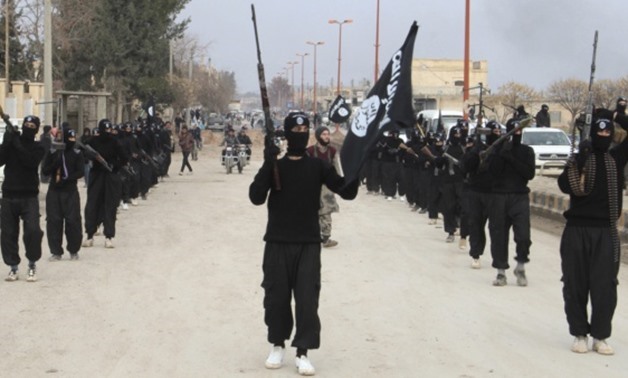
Islamic State militants parade in Tel Abyad, near Syria's border with Turkey. (Yaser Al-Khodor/Reuters)
CAIRO – 29 May 2018: Media ministers and officials from the four Arab countries boycotting Qatar affirmed the need to thwart terrorism by publishing positive media content in a meeting on Monday in the United Arab Emirates, Sky News reported.
The ministers met to discuss ways to confront media channels promoting terrorism and extremism and intervening in other countries’ affairs. Some media figures also attended the meeting.
The ministers stressed on the need for media to play a role in foiling the attempts of some regional countries to intervene in the affairs of the countries in the region through politicized media channels.
During the meeting, the ministers affirmed the need to eradicate extremism and terrorism, by destroying their financial and ideological bases, warning that anti-terrorism efforts will be unable to completely eradicate terrorism otherwise.
Makram Mohamed Ahmed, president of the Egyptian Higher Council for Media Regulation, praised the succession achieved by the Arab quartet, explaining that Qatar’s ambitions in Syria, Iraq and Libya have shrunk, while Iran is rethinking its actions.
“We have to tell extremism supporters it is enough,” Saudi Minister of Culture and Information Awwad Saleh Al Awwad said in a post on his Twitter account. Media support of terrorism is a serious regional and international danger, he explained.
Prince of Abu Dhabi and Deputy Supreme Commander of the United Arab Emirates Armed Forces Sheikh Mohamed bin Zayed Al Nahyan said that uprooting terrorism’s ideological roots and uncovering extremist organizations’ falsified discourses are the ways to thwart terrorism.
He said that combating terrorism and extremism ideologically and with information is just as important as security and military operations. Instead, the former can be more influential due to the role of media to promote tolerance and positivity.
Abdel-Mohsen Salama, head of the Egyptian Journalists' Syndicate and Al-Ahram chairman; Ali Mohammad Al Rumaihi, Bahrain's minister of information affairs; and Sultan Ahmed Al Jaber, UAE minister of state and chairman of the National Media Council, also attended the meeting. The media officials had also met in August 2017.
Egypt, Saudi Arabia, the UAE and Bahrain announced they are severing relations with Qatar over "its continuous support for terrorism," closing their airspace and seaports for Qatari transportation in June 2017. The Arab quartet issued 13 demands to Doha – then shortened to six principles – including closing Al-Jazeera television channel, which the quartet says promotes extremism and publishes false news.
In May 2017, the Egyptian authorities decided to ban 21 news websites, including HuffPost Arabi and Qatari-based Al-Jazeera, for "supporting terrorism and publishing fake news."
On Saturday, Qatar said it was banning products originating from the quartet countries. “To protect the safety of consumers in the State of Qatar and to combat improper trafficking of goods, the government issued a directive to find new suppliers of the variety of goods impacted,” the Qatari government said in a statement.


Comments
Leave a Comment